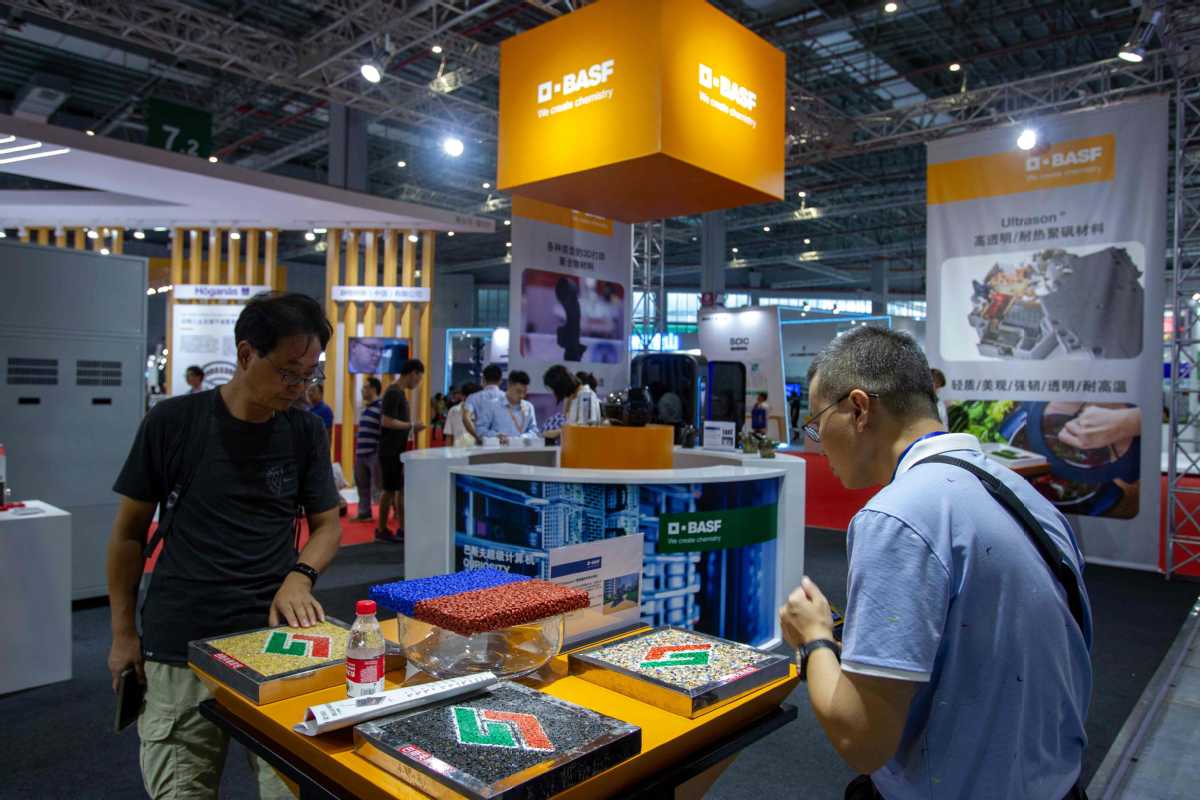Innovation key to economic resilience
China Daily | Updated: 2019-09-24 10:11

Editor's Note: The Chinese government has adopted a series of measures to boost economic growth, including stimulating consumption, further opening up to foreign investment, supporting private enterprises and encouraging technology innovation. China Daily asked senior executives of well-known multinational companies to share their views on the country's economic development and their companies' business strategies in China.

BASF executive says expanding R&D will enable firms to develop solutions to meet evolving customer expectations
China has rolled out a series of measures to stimulate consumer spending and boost economic growth. What opportunities are there for your business?
We are delighted to see various stimulus incentives from the Chinese government to boost car buying, as our coatings business is directly linked to the car production volume. Such incentive measures will rekindle consumers' confidence and optimism, which has been shrinking for many months. But we need to note that it will take some time for consumers' confidence to transfer into real car production and sales volume for our customers.
China's automotive market is still the largest in the world, with an annual production of some 20 million cars, which is a key market for BASF. Instead of lamenting the decrease in growth rate, we have been focusing on doing the basics right, including sharpening technology leadership, optimizing local footprints and tightening customer relationships.
Overall Chinese economic growth has slowed, but the topline numbers remain relatively robust. In what areas do you plan to increase investment or employment?
China is, and will remain, the major driver of profitable growth for BASF. Despite the challenging market conditions since 2018, we keep our long-term focus and remain optimistic about the Chinese market and its growth potential.
We continue to invest for future growth, especially in local production and innovation. BASF Coatings has invested more than 400 million euros ($442 million) in China over the last couple of years, building up a strong production footprint in Guangdong and Shanghai, as well as larger R&D presence in Pudong, Shanghai. The setup allows high local production and technology development capacity, operational efficiency and speed to market - all of these are designed to support our customers with customized solutions developed in China, for China.
What business opportunities do you see as China continues to pursue higher-quality growth, which is increasingly driven by service and consumption?
Especially over the course of the past 20 years, China has entered a new phase of economic development, with a focus on quality instead of just quantity. This is where chemistry fits in. Chemistry is a key enabler for the development of many downstream industries. With our global expertise and know-how, we help our customers realize this quality revolution in two ways - by providing innovative solutions that help our customers make their innovations into reality; and by sharing best practices in important areas like environment, health and safety management.
What do you see as the most resilient part of the Chinese economy and how do you plan to align your business with it?
Chinese people, no matter where they are from and how old they are, are always seeking a better life and are forward looking, which, from my point of view, is the fundamental driving force for the Chinese economy.
Some 20 to 30 years ago when most families bought their first cars, there were only a few choices and they were just proud to own one; now when there are so many choices, they are starting to care about personalized color and whether a car is lightweight, economic, and using environmentally friendly materials such as waterborne coatings. That's how society evolves and progresses.
Therefore, we are optimistic about the future development of the market, the increasing sustainability demands from our customers, the more sophisticated consumers' needs and the growth potential. We see more exciting opportunities coming from localization, structural changes, different segments, and the second-, third-or even fourth-tier cities.
How has your company adjusted to the uncertainties brought by trade frictions between China and the United States?
As an international company with integrated global value chains, minimizing trade barriers and tariffs is essential to BASF operations. The company benefits - as do customers - from free trade as any kind of duty represents an indirect tax. We are therefore concerned about the recent US announcements, and the response of several of US trading partners, including China, to impose import tariffs on a wide range of products that could affect the chemical industry and its numerous customer industries, including the automotive industry.
We are still analyzing the potential consequences of such measures on our business. BASF is deeply convinced of the value of open markets and a rules-based global order. We hope governments will, in the end, resolve trade disagreements through sustained multilateral dialogue and in respect of WTO rules.
China has adopted policies to further open the economy to foreign investment, to transform financial services and to promote private enterprises. How are you planning to take advantage of these policies?
China has become a more open and transparent market in the past decades. The Chinese government has been opening its market to the world in the pursuit of sustainable innovation. It is important to stay on this path, and even to accelerate, whatever global economic or political fluctuations might come.
In the past five years, the Chinese government has been enhancing its services to businesses. As a multinational company doing business in China, we have benefited from the simplified approval processes as well as the broadening of market access. Therefore, we are able to build a wholly owned smart Verbund site in Guangdong. The diverse product portfolio will contribute to the sustainable development of the downstream industries in South China. The overall investment will reach $10 billion upon completion.
The new measures open up more investment areas, such as the first foreign wholly owned automotive plant, which lowers the investment entry barrier and provides solid support for foreign investors to continue our presence in China. We especially welcome the VAT-reduction measures that directly reduce our operational costs.
How does your company plan to take advantage of the technology transformation opportunities in China over the next decade?
For the automotive industry, we are already in this process as many of our OEM customers are advancing major technological breakthroughs. New players entering the industry are especially keen to use the latest technology and innovate vigorously. If you look at the automotive megatrends of connected, autonomous, shared and electric, each of these trends is driven by leading technology and strong innovation power. That's why we are expanding our local R&D setup to develop and launch solutions together with our local customers.
Innovation has made BASF the leading chemical company. BASF's research and development will be more closely connected organizationally and thus more focused on customer needs. This will help to shorten the time to market and accelerate the company's organic growth.
For example, BASF is the leading supplier for new players in China's new energy vehicle segment. We offer a total coatings solution package to these new players. We have started cooperation and supply with many new NEV customers.
























